
Funk, power pop, adult contemporary, Eurodisco — there’s a little something for everybody this week! Or, as Dw. Dunphy (who is never at a loss for words) put it, ”I HAVE NEVER LOVED ANYTHING QUITE LIKE I LOVE THIS LIST. Or, well, it’s kinda nice.”
#11 Rick James, ”Super Freak (part 1)” (1981)
#1 on the dance charts, #16 Hot 100.
Dan Wiencek — With a riff like that, could this have not been a hit? Well, given Hammer’s subsequent appropriation of it, I guess we can conclude the answer is no. I’m kind of a downer on most of this week’s entries, so let me put it in black and white: this is killer. I’m not enough of an expert on funk/R&B to categorically state that this is the last of the “old school” tracks to strike it big before Purple Rain completely changed what R&B sounded like, but that’s how I remember it. Kind of a shame that most young people now think of Rick James as a punchline on Chapelle’s Show. (Not that that shit wasn’t hysterical.)
Java Joel Murphy — In the fall of 1981, most milquetoast American top 40 radio stations were still hesitant to play anything remotely resembling disco. This was not disco, but it was danceable. Which may explain why it failed to crack the pop top 10. I was lucky. My local AM daytimer top 40 outlet, WPDM in Potsdam banged the heck out of it. While it was a massive R&B hit, it really didn’t attain Legendary Status until MC Hammer’s 1990 rip. Meanwhile, songs that elicited ZERO passion by Dan Fogelberg (“Hard To Say”) and Mike Post (“Theme From Hill Street Blues“) were being aired to death.
Ted Asregadoo — I’m an old guy, so this song was part of my high school soundtrack. It was all over Top 40 radio where I lived (SF Bay Area) and really never went out of favor in my circles. Sure, Hammer gave the song a second life, but back in ’81 there was no doubting the brilliance of “Super Freak” — or the rest of tunes on Street Songs — as anything but an instant classic.
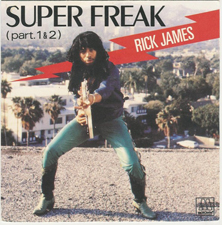 Dw. Dunphy — We had Parliament with “Flashlight” in the ’70s, and we had Rick James with “Super Freak” in the early ’80s. Then we’d get Prince in arguably his best era. Man, we were spoiled for the funk, weren’t we?
Dw. Dunphy — We had Parliament with “Flashlight” in the ’70s, and we had Rick James with “Super Freak” in the early ’80s. Then we’d get Prince in arguably his best era. Man, we were spoiled for the funk, weren’t we?
Dave Lifton — It’s impossible to hear this now without thinking of Chappelle’s bit was arguably the funniest episode of television of the past 10 years because it was so believable. A few months ago I saw a hipster wearing an “I’m Rick James, bitch” t-shirt and I came very close to saying to him, “What did five fingers say to the face?” Let’s not forget that, as much as he could look back at his past and laugh, he and his wife imprisoned and tortured a woman with a crack pipe, and he did a couple of years in Folsom for it.
Or we can just put “Super Freak” on repeat play and dance all night.
Jon Cummings — Dave, let’s not blame this single (and, by extension, “U Can’t Touch This”) for providing the proceeds that bought that torture chamber … let’s blame “Party All the Time” instead.
Brian Boone — I never remember to bring my supermarket club savings card when I go to the supermarket and so they let you enter in a phone number. I have no idea what phone number from ten years ago they have on record for me, so I, like many other white males over the age of 30, enter in 867-5309. No one ever seems to notice. Whoever actually has that on file as their actual phone number with the supermarket club savings card must have gas points like you wouldn’t even believe. And that is the legacy of this song.
Chris Holmes — Pardon my French, but this is fucking epic funk right here. This has to be one of the Top 20 hooks ever, right?
And you just know Rick James slept with every dancer in that video.
Rob Smith — What a great hook. What an amazing groove. So strong, it not only cemented James’ place in the funk pantheon (though he was selling three or four million albums each time out BEFORE Street Songs), it reached nine years into the future and gave a dancer/rapper/genie from Oakland a career, too. That’s something else, folks.
Jack Feerick — You guys knew that Rick James used to be in a band with Neil Young, right? Rick jumped ship and went AWOL from the Navy in the early 60s, made his way to Toronto, and joined a bar band called the Mynah Birds; Neil drifted into the band in 1966, just as they were starting to get sniffs of label interest. They went to Detroit — Neil included — to cut a demo for Motown, and while they were there Rick got arrested and did a prison stint for desertion. What a might-have been. Such a weird story, just one of many in such a weird life.
I’m writing about this because, Jesus, what can I say about ”Super Freak”? If ever a song spoke for itself…
#12 Tommy Tutone, ”867-5309 / Jenny” (1982)
Hit #4 in the Hot 100, #1 in the Top Tracks.
Of course, these days in most major cities if you call 867-5309 you’ll get a sultry female voice on a recording, saying, “You must first dial an area code, then the seven-digit number.”
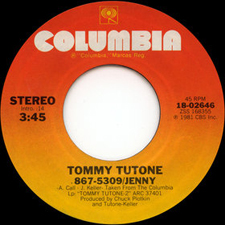 Asregadoo — The first time I heard this tune was on KZAP in Sacramento (back in the day when teens listened to the radio while getting dressed for school). The instant likability was pretty self-evident from the intro, but I got my hat handed to me when I visited my cousins in the U.K. that year. They asked me “What groups or songs do you like these days, Ted?” When I mentioned Tommy Tutone and Huey Lewis’ “Workin’ For A Livin'” (mostly because they were San Francisco bands who hadn’t quite made it to mainstream airplay at the time), I got the following responses: “Bullocks.” “Who the hell are these bands, anyway? You should be listening to Duran Duran and Kim Wilde if you like pop music.” And thus began my deep crush on Kim Wilde — who had her own telephone number song in ’81 (“2-6-5-8-0”)
Asregadoo — The first time I heard this tune was on KZAP in Sacramento (back in the day when teens listened to the radio while getting dressed for school). The instant likability was pretty self-evident from the intro, but I got my hat handed to me when I visited my cousins in the U.K. that year. They asked me “What groups or songs do you like these days, Ted?” When I mentioned Tommy Tutone and Huey Lewis’ “Workin’ For A Livin'” (mostly because they were San Francisco bands who hadn’t quite made it to mainstream airplay at the time), I got the following responses: “Bullocks.” “Who the hell are these bands, anyway? You should be listening to Duran Duran and Kim Wilde if you like pop music.” And thus began my deep crush on Kim Wilde — who had her own telephone number song in ’81 (“2-6-5-8-0”)
Holmes — In an alternate universe, this is the song that allows the Kinks to sustain the surge of popularity from their first album. But alas, it instead goes down as one of the great one-hit wonder tracks of the decade. Either way my toes are still tappin’.
Wiencek — So what are we up to so far, *three* songs with references to masturbation in the lyrics? At least? I will refrain from drawing any correlations between that observation and the state of the culture at large in the early ’80s. I will simply say this is a pretty cool track, one of those song ideas that seems so natural and obvious you wonder why it wasn’t done ages ago. Good for these guys.
Smith — The next town over from where I live uses the 867 exchange; I pity the poor schlub who had to answer calls for Jenny back then. It’s unfortunate Tommy Heath and Jim Keller couldn’t come up with another hook as good as this one — they could’ve easily latched onto the Springsteen/Huey Lewis/John Cafferty bar-band-rock-as-virtue movement a couple years afterward.
Murphy — Like countless dumb kids, I tried calling the number during Easter break 1982 while my parents were at work. I got some lady in Utica NY. She was pretty cool about it. Wonder how she felt about it a few months later after the song was peaking. First heard it on the eternally awesome Chez 106 out of Ottawa, Canada. At the time, they weren’t your average AOR station. Sure, they’d play J. Geils and Rush and Billy Squier. But they’d also play Elvis Costello and Ry Cooder and Marianne Faithful. This was definitely one of those first listen type of songs. As good as any power-pop jam of the day. I miss Chez 106. Nowadays, they’re your basic run-of-the-mill, overly-researched classic rock station.
Feerick — The fact that the riff is essentially stolen from ”Secret Agent Man” in no way diminishes the greatness of this song. Quite the contrary. There are a million songs with the ”Secret Agent Man” lick, and I quite like a lot of them…
Lifton — “This is Radio Nowhere / Is there anybody alive out there?” What, were you all just waiting for me to say that?
Feerick — …except for that one.
Lifton — As New Wave/power pop, this isn’t nearly as good as “My Sharona” or “Jessie’s Girl,” but it still works. And neither of those songs were responsible for what is arguably the saddest moment in Mellowmas history.
Dunphy — Love/hate for me in it’s fullest form. You can’t hate the song because it is just flat-out textbook great power-pop. But this song was the stereotypical inescapable hit in its day. You couldn’t turn around without getting smacked in the gob by Jenny. Still I’d rather have it in my world than not.
”Santa Jenny,” on the other hand… not so much.
#13 Kim Carnes, ”Bette Davis Eyes” (1981)
#1 on the Top 100 for nine weeks. Record of the Year and Song of the Year at the 1982 Grammies.
Dunphy — An interesting curio of the times, the song sounds nothing like its original incarnation, and it is all fluorescent paint buffed to a high-gloss sheen. I never turn it off when it comes on the radio, but I don’t really seek it out either.
Carnes was mostly known for her AC sides like “Don’t Fall In Love With A Dreamer” so this song reset her career, at least for a short period of time. Then it seemed like she got stuck in the synth-sound and was soon replaced in our scratchy-voiced consciousness by Bonnie Tyler.
Lifton — Even when this was popular I never got its appeal. I was surprised to learn years later that it was co-written by Jackie DeShannon, which bothers me because she’s responsible for my all-time favorite couplet in pop music (“I close my eyes for a second and pretend it’s me you want / Meanwhile I try to act so nonchalant”).
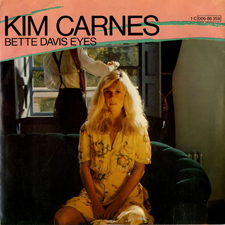 Asregadoo — Nine weeks at #1 = nine weeks of hell.
Asregadoo — Nine weeks at #1 = nine weeks of hell.
Holmes — Gah. Like sandpaper on my ear drums. This thing could not disappear fast enough for me.
Wiencek — Record of the Year? This? Fucking hell. Maybe there were a lot of Bette Davis fans in the Academy back then. It isn’t even that it’s that bad; it’s just not really anything, an exercise in mood-setting that dissolves on the tongue like a breath mint.
Smith — The woman who stole Bonnie Tyler’s career as Rod Stewart with a vagina (which some claim describes Stewart himself) gets her biggest hit — a record that sounded so strange, even as it used all the typical tools of early Eighties production (the synths, the echo, the thin-sounding drums, the sound effects at the end … oh, and the synths, too). She and Tyler are both still alive, are they not? They should tour together, opening for Stewart. Put ’em all on a Vegas stage.
Cummings — I can’t believe that no one has responded to this with the classic caption, “?????”
Lifton — You’re fee tines a maby, Jon.
Cummings — I know, right? And I believe that’s “Mady” to you. She gah meddy bayda ayyyyy…
Lifton — I almost went with the Buckwheat angle but decided to go with Jackie DeShannon instead.
Murphy — The first of its genre? Adult Contemporary New Wave! This song was so ubiquitous it earns the title of First Song That I Ever Grew Sick Of. Honestly, I didn’t like it nearly as much as “Morning Train” or “Stars On 45”. Then again, I was only six.
Feerick — I’ve always loved old movies, and I’ve always hated this song. The two facts are not unrelated. ”Bette Davis eyes,” to me, always sounded like a euphemism for a thyroid condition.
According to producer Val Garay, this was recorded completely live in the studio, all the electronic percussion and keyboards and everything, no overdubs, and this was the first take. Which just goes to show that even the magic of live performance, with everybody all in the same room together listening to each other, can produce something that sounds as soulless as a MIDI karaoke track.
The one-take nature of it does account for the fact that Kim Carnes sounds like she’s been punched in the throat just before getting on mic. I dunno; the song was recorded on the night of the day John Lennon was shot, so maybe she’d been crying all day. At least we were spared a maudlin, half-assed cover of “Imagine.”
Dunphy — Check it — Kim Carnes also did backing vocals for the Fat Albert theme song…
[youtube id=”cFDBW7Xgagg” width=”600″ height=”350″]#14 The Alan Parsons Project, ”Time” (1980)
Reached #15 in the Hot 100; the first Parsons project song to feature the voice of Eric Woolfson.
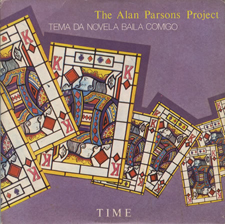 Feerick — No official video, alas; but apparently this was later used as the theme song for a Brazilian TV soap opera — this rather beautiful picture sleeve is from a Brazilian tie-in release — and I’ll bet you some South American YouTube enthusiast has put together a clip from snippets of the show. I can’t be bothered to look, myself; just imagine lots of lipstick, pomade, open shirts, big hair, suntans, and heaving cleavage.
Feerick — No official video, alas; but apparently this was later used as the theme song for a Brazilian TV soap opera — this rather beautiful picture sleeve is from a Brazilian tie-in release — and I’ll bet you some South American YouTube enthusiast has put together a clip from snippets of the show. I can’t be bothered to look, myself; just imagine lots of lipstick, pomade, open shirts, big hair, suntans, and heaving cleavage.
It was at around this time that the story really got rolling about Pink Floyd’s Dark Side of the Moon, and how it was still in the charts after something like 500 weeks. All I can imagine is that Parsons must have done the math, figured out how much his onetime employers were raking in, and figured it was worth trying to catch lightning in a bottle for a second time. It’s pretty enough, but the ugliness of the cynicism undercuts that to an extent.
Dunphy — I think this is basically APP doing their (his) version of a Beach Boys song.
Feerick — Ooh, that’s nice. Hasn’t thought of that. The stack-o-vocals is definitely there. And Woolfson’s voice is beautiful, in that sleepy English way.
Dunphy — Eric Woolfson was the primary writer of the songs for the unit, but at first he only sang on the demos. Quickly, he became the singer most associated with the project, even though they regularly had a vocal roster that included Colin Blunstone from the Zombies, David Paton from Pilot, Allan Clarke (The Hollies), and later Gary Brooker (Procol Harum).
Smith — Parsons apparently accumulated enough good will with the Floyd crew (from his engineering work on Dark Side of the Moon) that they did not sue his ass for an obvious rip of “Us and Them.”
Lifton — Parsons may have ripped off “Us and Them,” but Fountains Of Wayne ripped off this song for “Prom Theme,” except they wrote a much better song with it.
Holmes — Speaking of which, I used to work for Adam Schlesinger’s mom. And I drove by the business that they got their band name from every day.
I know, you’re all jealous now.
Asregadoo — “Goodnight Moon. Goodnight cow jumping over the moon. Goodnight Alan Parsons Project. Goodnight boring-ass song that puts me to sleep.”
Wiencek — I was expecting “Eye in the Sky”; that one at least has something of a hook. This is just boring. I keep waiting for it to build to something and it keeps just rolling along at the same monotonous pace. That may explain why I have no memory of hearing it when it came out.
Holmes — Despite Parsons’ connection to Floyd, I never bothered to seek out his Project material. And I think Rob nailed it, this is a total “Us and Them” rip. This is definitely a holdover from the ’70s, and not in a good way. Some decent chord progressions, but otherwise quite bland.
Murphy — Totally brings me back to the summer of ’81 – the summer my Dad built a deck for our backyard swimming pool. I always associate this one with the Climax Blues Band’s similarly sleepy “I Love You”. Pretty haunting song. I remember 6 years later it being used in an episode of 21 Jump Street. Of course, you won’t find it on the DVD since they replaced all the songs with generic “incidental music”. Bastards!
Cummings — When I was 15 I thought this song was remarkably profound. Now I think it’s “Comfortably Numb” after too many brain cells have been destroyed by … whatever made you comfortably numb.
Feerick — In my case, at least, that too would be ”time.”
#15 Laura Branigan, ”Gloria” (1982)
#2 in the Billboard Hot 100, #1 in Australia and Canada, Top Ten elsewhere.
Boone — Did teenagers and young people actually listen to this? It’s a decent, run of the mill, over synthed ’80s pop song, but when I hear the opening strains, all I hear is “This Jazzercise class is about to get REAL.”
Wiencek — This song is like a police siren with a rhythm track — I just want to get out of its way and let it pass. If this song were an email, it would be written in red, with ALL CAPS and a dozen exclamation points. Dammit, Laura Branigan, stop shouting at me.
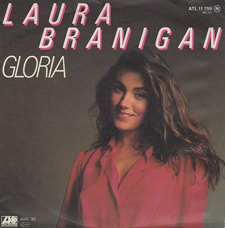 Murphy — In the fall of ’82, my parents got MTV. And it was awesome. I loved it. My day-to-day, at-home radio listening was immediately put on the back burner. I would only hear this song in the car and on Solid Gold. I was never a fan. Too girly-girly for me (like Sylvia’s “Nobody” — anyone remember that cornball piece of shit?). My sister, however — four years my senior — loved it. Myself, I preferred 1984’s much hookier, “Self Control”.
Murphy — In the fall of ’82, my parents got MTV. And it was awesome. I loved it. My day-to-day, at-home radio listening was immediately put on the back burner. I would only hear this song in the car and on Solid Gold. I was never a fan. Too girly-girly for me (like Sylvia’s “Nobody” — anyone remember that cornball piece of shit?). My sister, however — four years my senior — loved it. Myself, I preferred 1984’s much hookier, “Self Control”.
Feerick — For no earthly reason, at the time I thought this song had something to do with the 1980 John Cassevetes movie of the same name, which featured Gena Rowlands as a onetime gun moll on the lam. Which gave a different context to the lines about being ”always on the run” and them knowing ”the alias that you’ve been living under.” I know that’s not what the song’s about, but to this day I have a hard time imagining Laura Branigan’s hard-living party princess — I keep seeing a tough-as-nails middle-aged woman with a gun in her purse.
As for Branigan — she was a belter, that’s for sure, and her voice was made for this kind of high-energy disco. But she was kind of a one-dimensional talent, not unlike Michael Bolton (with whom she was associated, having been the first to record ”How Am I Supposed To Live Without You”). You just wish she’d dial it down a little.
Holmes — Who says disco was dead by the early ’80s?
Cummings — I love pretty much everything about this song, from its Italian origins to its over-the-top vocal, from Branigan’s ability to make the word “line” sound like “left hang” to the fact that the song’s lyric is complete and utter nonsense … and even to the way Branigan used to circle her hand next to her ear as she sang about “all the voices in your head” on Solid Gold” (on which, if I remember correctly, she appeared practically every week for a year). Forget “Centerfold” or “Physical” or “I Love Rock and Roll” or even Hall & Oates’ hits … for me, this was THE pop song of the pre-Duran Duran/Culture Club early ’80s.
Smith — I remember how fast this thing climbed the charts — went from nowhere to Number Two in no time flat — and how cool it sounded at the time. Those keyboards just exploded out of the speakers, and Branigan’s voice was the perfect mix of diva slickness and rock chick roughness. It’s a shame she died when she did; she’da been a perfect candidate for a Cher/”Believe”-style comeback. But this is great stuff, one of the best singles of its year.
Murphy — Actually, it took forever for “Gloria”to peak. Hit the charts in early July, didn’t peak until of January of ’83.
Smith — Really? Man, I could swear I remember the thing jumping up the charts. Huh.
Holmes — “Gloria” actually peaked in November ’82.
Jason Hare — Just like Lifton!
Wiencek — #HareWin
Feerick — Ahem. Chris is correct: ”Gloria” reached the #2 spot in late November ’82, and held it for three weeks. Still. Four and a half months; nothing to sneeze at.
Hare — I’m just surprised nobody’s mentioned that “Gloria” is a cover:
[youtube id=”HYvuWlOnBjI” width=”600″ height=”350″]Holmes — I was going to, but then realized I don’t care about it that much.
Asregadoo — One of my best friends is originally from Chile, and when “Gloria” came out in the U.S., he knew it was a Spanish language hit and would often sing the song in Spanish while the Branigan’s English language version played on the radio. Yeah, those were really good times. And by good times, I mean I almost killed him every time he did that.
Parr — Am I imagining things, or was “Gloria” the theme song to an “All in the Family” / “Archie Bunker’s Place” spin-off?
Holmes — As sung by Jean Stapleton? Awesome.
Feerick — Huh. I don’t remember this at all, but it turns out there was a Sally Struthers vehicle called ”Gloria” — co-starring Burgess Meredith, of ll people! — that aired for a single season in 82-’83, but no indication of a Branigan connection.
Lifton — What may have sounded cool back then now comes across as stiff and lifeless (speaking of which — Jason, you’re right, sad to say). Yeah, disco wasn’t really dead, but I wonder what Giorgio Moroder could have done with this for Donna Summer, because Branigan is clearly trying to sing like her. I don’t think there’s much in the song here, but he would have made a great record out of it.





Comments